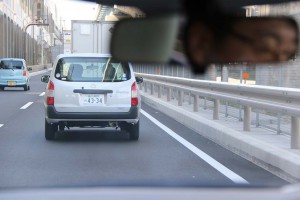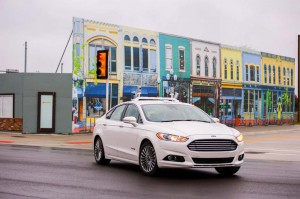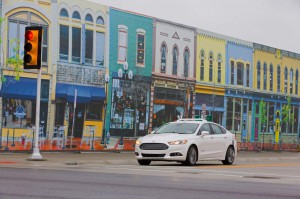Ford is moving its autonomous vehicle test program a big step forward – and helping the new Mcity proving grounds get into gear, as well.
The Michigan automaker was the first to officially test a fully self-driving vehicle at the new, 31-acre facility dedicated by the University of Michigan over the summer. The Mcity complex is intended to replicate the terrain and conditions autonomous vehicles will face in real-world situations.
“Testing Ford’s autonomous vehicle fleet at Mcity provides another challenging, yet safe, urban environment to repeatedly check and hone these new technologies,” explained Raj Nair, Ford group vice president for global product development. “This is an important step in making millions of people’s lives better and improving their mobility.”
Ford is one of the many automakers racing to develop autonomous technology. But it is not considered one of the leaders in the field. A new study by the IHS Automotive indicates that tech giant Google is actually at the head of the race – but its challenge will be to find automakers willing to license its software.
Tesla last month began rolling out its semi-autonomous AutoPilot system, which will allow a vehicle like the Model S sedan to drive hands-free on well-marked, limited-access highways. Cadillac will add a similar system, called Super Drive, on its new CT6 sedan next year. And Nissan plans to roll out a series of ever more advanced semi-autonomous systems by 2020 when it promises to have its first fully-autonomous model in production.
Ford has not yet announced a target date for launching its own semi- or fully-autonomous technologies beyond saying the modified version of a Ford Fusion it revealed in December 2013 is in the “advanced engineering” phase. It is clearly trying to keep up with the competition.
Another new study, this one by AutoPacific, Inc., shows that a majority of U.S. motorists want some of the early technologies, such as collision warning with auto-braking, that will lead up to self-driving vehicles. And a growing number indicate they’re looking forward to fully-autonomous cars, as well. That is expected to grow as the technology comes closer to production.
(For more on those two new studies, Click Here.)
A number of states, including Michigan, California and Nevada, have crafted rules allowing automakers to test autonomous vehicles on public roads. Google, for one, is launching a fleet of self-driving prototypes near its Silicon Valley headquarters. But experts say there are reasons why some testing should be done on private facilities like Mcity.
Among other things, manufacturers can take risks that wouldn’t be permissible on streets where there are pedestrians and other vehicles at risk.
(Autonomous vehicles involved in unusually high number of real-world crashes. Click Here for the story.)

Automakers are doing more and more testing on real roads, here a Nissan Leaf maneuvers through traffic in Tokyo.
Located near the North Campus of the University of Michigan, in Ann Arbor, the MCity complex is a sort of movie set created for autonomous testing rather than filmmaking. It features a short highway stretch, a simulated downtown, complete with crosswalks, curbs, stoplights and bike lanes.
“The goal of Mcity is that we get a scaling factor. Every mile driven there can represent 10, 100 or 1,000 miles of on-road driving in terms of our ability to pack in the occurrences of difficult events,” Ryan Eustice, University of Michigan associate professor and principal investigator in Ford’s research collaboration with the university, said in a statement.
The $10 million public-private project has drawn a wide range of sponsors including not only Ford but domestic makers General Motors and Fiat Chrysler, as well as Japan’s Toyota, Nissan and Honda, and even China’s Changan Automobile Group. There are some of the world’s largest automotive suppliers, including Detroit-based Delphi and Japan’s Denso, along with major tech and telecomm firms such as Verizon, Xerox and Qualcomm.
(Navigating Tokyo traffic in an autonomous Nissan Leaf. Click Here to come along for the ride.)


